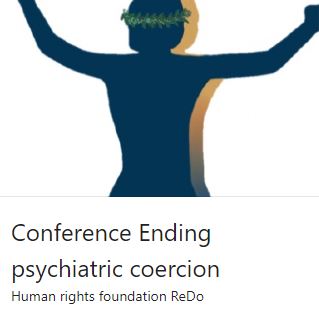“Ending Psychiatric Coercion – Urgent Need for Effective Remedies and Reparations” – Centre Members to Speak at Upcoming Conference
Prof Dainius Pūras, the former UN Special Rapporteur on the Right to Health, and Alberto Vasquez, Co-director for the Center for Inclusive Policy, will be speaking at an upcoming conference in Oslo (in person and online) on 10 September 2024, organised by the Human Rights Foundation ReDo*.
Please see below for further details and how to register:
Topics that will be covered at the conference include –
- Human rights standards relevant for ending psychiatric coercion & reparations
- Severity of human rights violations and harm done
- Legal reforms to end psychiatric coercion
- Access to justice, effective remedies and reparations – the important role of the courts
- Strategic litigation & way forward (European Court of Human Rights & other regional human rights bodies, UN treaty bodies, regional and global perspectives)
Speakers –
- Dainius Pūras, Professor, Vilnius University, former UN Special Rapporteur on the right to health
- Carlos Rios Espinosa, Human Rights Watch (HRW), former member of the UN CRPD Committee
- Tina Minkowitz, Center for the Human Rights of Users and Survivors of Psychiatry (CHRUSP)
- Alberto Vasquez, Co-director, Center for Inclusive Policy (CIP)
- Oh-yong Kweon, Yein Law Office, World Network of Users and Survivors of Psychiatry (WNUSP)
- Steven Allen, Executive Director, Validity Foundation
- Jennifer Wairimu, Litigation Officer, Validity Foundation
Location: Litteraturhuset, Wergelandssalen, Oslo
Time: 09:00 hrs – 16:30 hrs

The conference is open for everyone and free of charge and will be held both in person and broadcast online in passive mode.
Please register here, for both in person participation and online participation
For questions about the conference please contact Hege Orefellen at hegejo@kjemi.uio.no
*The aim of the human rights foundation ReDo is to work against infringements, abuse, and coercion in the mental health system and to strengthen the human rights of persons with psychosocial disabilities, in line with the UN Convention on the Rights of Persons with Disabilities (CRPD). Work is centred on documentation of human rights violations in the mental health system and support for strategic litigation.
ReDo organizes an annual conference where a human rights award is given. This year’s conference focuses on ending psychiatric coercion and remedies and reparations needed for these human rights violations, and is co-organized by WSO – We Shall Overcome, Norway
